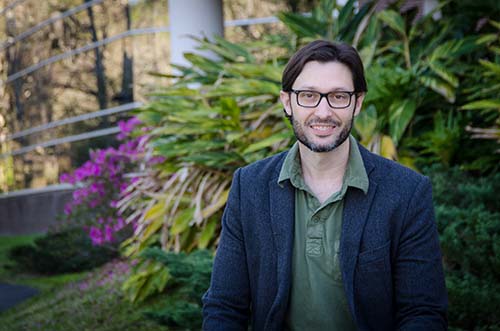Cancer research has relied on in vitro experiments with established cell lines to investigate the efficacy of chemotherapy drug panels, which limit clinical correlation. Targeting tumor-initiating cells could be a viable clinical strategy, but these cells are extremely rare, necessitating new methods for rapid and robust screening. Currently, oncologists lack the tools necessary to predict the success of various combination treatments from one patient to the next.
Dr. Benjamin G. Keselowsky, associate professor & UFRF Professorship in the J. Crayton Pruitt Family Department of Biomedical Engineering, is co-holder of a UF owned patent entitled “Cell-Based Arrays, Methods of Making, and Methods of Using.”
Keselowsky and other University of Florida researchers have developed a tool that allows the testing of multiple combinations of biological or pharmaceutical agents on small numbers of cells. The microarray separates the cells on a glass slide, allowing the user to test many agents at once: each agent is loaded into separate drug eluting films that target just a portion of the cells on the slide. Researchers can measure cellular response – including proliferation and differentiation – through immunostaining or by using contrast agents.
The impact is that this technology allows for testing multiple agents on small numbers of rare cells, providing a competitive advantage and requires only a small number of cells, lowering expenses and increasing productivity. Slides can also be stored long-term, decreasing waste and increasing utility.
Keselowsky also received the UF Term Professorship in 2017. This recognition is for excellence in teaching, research and service recommended by their college deans based on nominations from their department chairs and reviewed by the College Honors and Awards Committee.
Congratulations, Dr. Keselowsky!
Inventors:
• Emina Huang, M.D., associate professor, department of colorectal surgery, Cleveland Clinic
• Edward Scott, Ph.D., associate professor, department of molecular genetics and microbiology, College of Medicine, University of Florida
• Matthew Carstens, Ph.D. student, department of biomedical engineering, University of Florida
• Abhinav Prakash Acharya, Ph.D., research scientist, department of biomedical engineering, University of Florida
• Benjamin G. Keselowsky Ph.D., associate professor, UF Preeminence Term Professorship & UFRF Professorship, department of biomedical engineering, University of Florida
